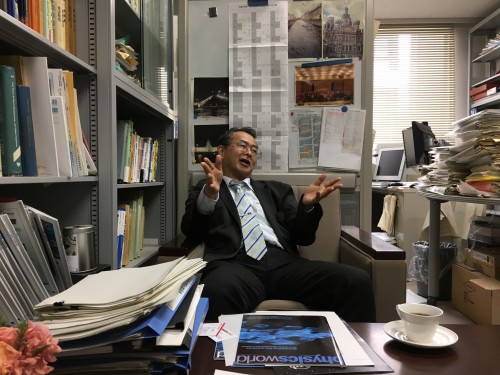
Thirteen and counting: Hikaru Kawamura wonders when Japan will get its next Nobel Prize for Physics.
By Matin Durrani in Osaka, Japan
Hikaru Kawamura, president of the Physical Society of Japan (JPS), handed me a brochure as we sat down in his office on the fifth floor of the Department of Earth and Space Science at Osaka University. Inside it were photographs of the 13 Japanese physicists who have won the Nobel Prize for Physics.
It’s an impressive list of people, starting with Hideki Yukawa, who won the 1949 prize for his theory of the nuclear force, and going all the way up to Takaaki Kajita who shared the 2015 prize for detecting atmospheric neutrino oscillations at the Super-Kamiokande underground lab. (They’re all men, of course, but that’s another story.)
However, Kawamura admitted to me during our 90-minute discussion, that he is “not optimistic” that Japan will be as prolific in terms of Nobel prizes in the future. Most Nobel laureates usually (though admittedly not always) win their awards for work done 20-30 years ago. So with Japanese physics these days being, as Kawamura puts it, “not so popular as it used to be”, how long will Japan have to wait for its next physics Nobel prize?
When he was a kid, in contrast, physics was all the rage. Kawamura, 63, grew up on a remote Japanese island and, back then, people in Japan saw scientific research as a way for the country to rebuild and revitalize itself after the devastation of the Second World War. Indeed, Kawamura told me how one of his school teachers “used to talk about Yukawa like he was a god”.
These days, Kawamura is worried about the declining output of Japanese physics and falling numbers of people doing PhDs in the subject. He is also concerned about the government cutting back on funds for “unconstrained” research at the expense of projects earmarked for specific targets. “There is a general concern in the community for fundamental science in future,” he warned.
That said, Japanese physics is pretty strong overall, with Kawamura pointing to plenty of areas where Japan is world-leading, such as elementary particle physics, solid-state physics, astronomy and creating new materials. But if Japan wants to continue to be a global leader in science, I feel it’s got to be up to societies like the JPS to make the case to government for continued financial investment in basic research.
Because without healthy funding, where will the Japanese Nobel-prize-winning physicists of the future come from?
Guidelines
Show/hide formatting guidelines
this text was deletedwhere people live in harmony with nature and animals</q>
Some text